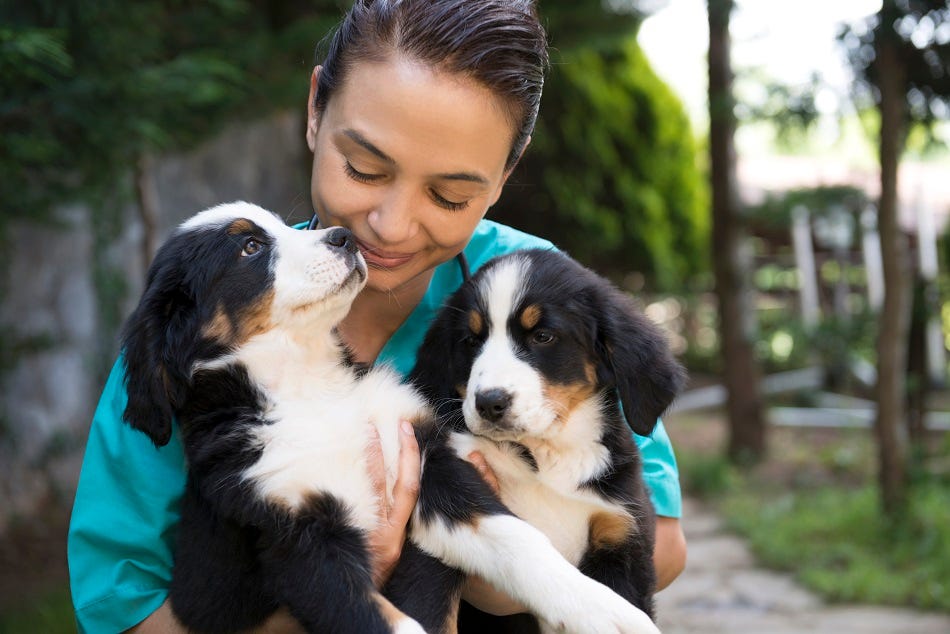Vaccinating and desexing your new pup are two very important steps you can take to ensure they live a long and happy life. Not only does desexing help limit the number of unwanted and homeless animals, it can also help improve a dog’s behaviour.
Just like humans, vaccinations can be crucial in protecting your pup from nasty illnesses and bacteria. While desexing is a decision that can be made later in life, getting your puppy vaccinated from the get-go is crucial to keeping them healthy. We’ll take you through everything you need to know about desexing and vaccinating so that you know all the steps to their necessary healthcare.
Puppy desexing
Desexing a puppy is a permanent procedure and cannot be reversed. It means they will no longer be able to fall pregnant, or impregnate another dog. Desexing plays an important role in minimising the number of accidental litters, and can be a powerful tool to help minimise the number of dogs on the street.
There are two main life stages that people have their pups desexed. These include:
- Early Age (6-16 weeks). Desexing at this age is common in shelters and welfare organisations who have dogs neutered or spayed prior to adoption.
- Peri-Puberty (4-7 months of age). This is the age that most vets recommend having your puppy desexed.
The idea of putting your furry friend in for surgery can be daunting. However, it is a completely safe procedure that is performed regularly without major side effects. Before you book your pet in for the surgery, make sure you find a vet that you trust. From there, you can discuss with your vet the surgery in more detail.
Desexing a female dog
It will come as no surprise that there are a few differences between desexing your female and male dog. Spaying is the surgical removal of the ovaries and uterus of the female puppy, making her sterile.
As well as preventing unwanted pregnancy, there are plenty of other benefits of spaying your female pup including the prevention of:
- Side effects of heat cycles
- Pregnancy
- Development of cancers in the female reproductive tract.
While female dog desexing is a standard procedure, it is considered a major surgery and performed under full anaesthetic. It also requires a short stay at the vet for your pup.
Desexing a male dog
The procedure to desex a male dog is called neutering. During surgery, the testicles are removed, making it impossible for him to father pups. The procedure is relatively quick, minimally invasive and generally not painful.
Neutering is carried out under full anaesthetic, but is a shorter and less complicated operation than female desexing. It also comes with a range of benefits beyond stopping unwanted pregnancies and can help prevent:
- Testicular cancer
- Prostate issues
- Certain behaviours like roaming from home or aggression.
Puppy care post surgery
After the procedure, your pup might be a little sore and drowsy, so they’ll need plenty of love and care while they recover. While the anaesthetic wears off, it’s important to keep them comfortable and calm.
The first thing you should do is try and keep them confined to a quiet and comfortable area of your house. Add plenty of blankets and a nice cosy bed for them to sleep in while they recover. You might find that your pup doesn’t want to eat or drink. You should try and encourage them to keep their fluids up and even try a little food - don’t force them.
Your vet will more than likely provide you with a collar to prevent them from licking or biting at their stitches. However, you should inspect the surgical site and check for swelling or discharge and keep a close eye on them to ensure that they don’t reopen their stitches.
You should call a vet if you notice:
- Swelling or bleeding around the stitches
- If your puppy is constantly licking the stiches
- Your pet is still drowsy and lethargic after 24 hours
- Your pup refuses to eat or drink.
You should also try to limit their exercise and movement while your pup is recovering. Try and discourage them from running, jumping or playing too aggressively. Vets recommend taking them for a short, slow walk in the following few days after surgery. However, if you notice they’re in pain or uncomfortable, take them home to rest straight away.
Puppy Vaccination
Besides desexing, puppy vaccines are one of the most important things to consider when it comes to your doggo’s health. Starting a vaccine schedule at a young age allows you to protect your pup from a number of serious and potentially life-threatening illnesses and build healthy vaccination habits for the rest of their lives.
The most common vaccinations that puppies receive are:
- Canine distemper
- Canine hepatitis
- Canine parvovirus
- Parainfluenza virus
- Bordetella bronchiseptica
At their young age, a pup’s immune system is still developing, which means they’re vulnerable to a range of illnesses and diseases. The recommended vaccination schedule for puppies starts at 6 to 8 weeks of age. There are then one or two booster vaccinations in subsequent weeks.
Remember, after your furry friend has been vaccinated, they need to avoid public areas or dogs that are not up-to-date with their vaccinations. Although it can be tempting to let them explore their new world, the vaccines will take a little while to build up resistance to viruses.
The vets at Best Friends Pets recommend annual booster vaccinations to provide the best protection throughout your dog’s life.
After vaccination, don't be surprised if your puppy or dog seems a little worse for wear. Talk to our friendly team at Best Friends Pets if problems persist.
Vaccination for puppy schedule
Creating a vaccination schedule that you find easy to stick to, while also ensuring that your pups shots are up to date is key to keeping them healthy as they age.
First vaccination
Your fur baby should have their first vaccination between 6 to 8 weeks. You might find that your pup is already vaccinated when you pick them up so make sure to check!
Booster vaccination
Booster vaccinations are given between 10 and 12 weeks. Your puppy will generally need two boosters to make sure they’ve built up enough immunity to protect them. Each booster vaccine should be given 3 to 4 weeks apart. At least one booster should be given after the puppy is 12 weeks.
Final puppy vaccination
Your fur babies final vaccine as a puppy should be given between 14 and 16 weeks.
Annual booster vaccination
The same way we get a flu shot every year, your dog needs to have a booster shot every year. These vaccinations will be given to your dog to keep them fully protected for the rest of their life.
Things to look out for after your puppy’s vaccination
Minor side-effects are completely normal after a vaccination. The vaccines stimulate your puppy's immune system, so they may have minor symptoms a few hours following their vaccination. These side effects will ease after a day or two.
Common side effects include:
- Tenderness or sensitivity at the vaccination site
- Fatigue
- Loss of appetite
- Fever
- Nasal discharge, sneezing or coughing.
While uncommon, there are a few major side effects that you should take seriously. If you notice any of the following, make sure to take your pet to your closest vet for a full check-up:
- Weakness
- Difficulty breathing
- Vomiting
- Loss of appetite
- Diarrhoea
- Limping
When it comes to your furry friend’s health, it’s also best to speak to a trusted vet. They will be able to provide you with an in-depth vaccination schedule and even remind you when your pup’s next one is due!
FAQ
When do puppies get vaccinations?
You should start vaccinating your pup between 6 to 8 weeks.
How many vaccinations do puppies need?
All dogs should receive the core vaccines of canine distemper virus, canine adenovirus and canine parvovirus. There may be other vaccines that your pup needs depending on where they live, lifestyle and risk of exposure to a specific infection.
How much does desexing a dog cost?
The cost of desexing will vary across clinics. The average price ranges from $200 to $500. Factors like your puppy's gender, size, age and other individual factors will also influence the total price.
When to desex your puppy
While there are definitely recommendations on the age your pup should be, it’s always best to speak to your vet. Some puppies can be desexed from as young as eight weeks, whereas others may be a few months old. The general recommendation is that dogs should be desexed before they hit puberty. For the best advice, you should speak to your vet. They will be able to assess your pup and make recommendations based on their age, sex and size.




